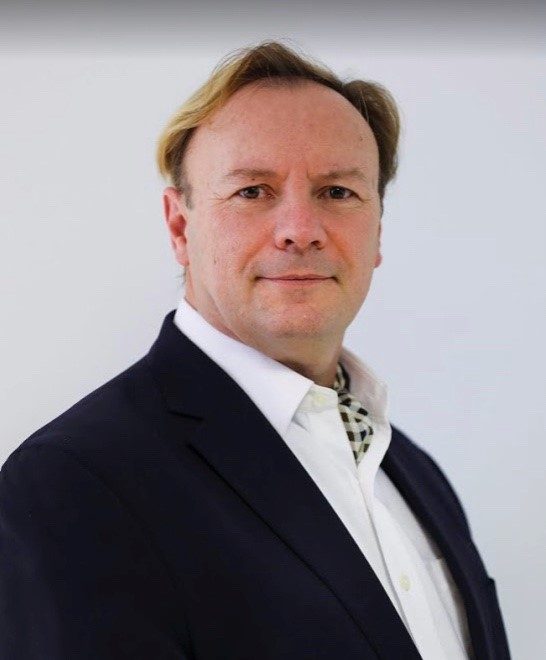
Portrait
Very early in his career, Frédéric Rombaut decided to devote his life to “building a connected world.” Entrepreneur, investor, corporate director—telecommunications networks and cutting-edge technology have always been the focus of his passion.
Becoming an engineer
When he was 17, Frédéric Rombaut’s dream was to be a sound engineer. A music and radio enthusiast, he created his own radio when he was still in high school.
“To figure out how to find my way, I met with a sound engineer at France Musique. He showed me around his control booth and the Radio France auditorium. He advised me to study electronics before acoustics to have a good foundation. A few days later, an electronics engineer strongly recommended theÉcole Centrale d’Électronique” he recalls.
That’s how Frédéric Rombaut ended up with a diploma from ECE in 1988. Engineering school was an entry into the electronics and computer science fields. “I realized that what motivated me was technological innovation“, he explains.
Creating his first junior enterprise
Making the most of his knack for business, Frédéric Rombaut and his friends in his year founded ECE’s: Hi-Tech, now called JEECE.
“Our goal was to create opportunities for students and to make their skills available to businesses. To publicize the junior enterprise, I created a magazine where we described our plans, our skills, etc. Soon it was the businesses that were calling us!“says Frédéric.
Starting his career with panache
When he left ECE, Frédéric Rombaut had a choice between France Télécom and IB2 Technologies, a new IBM / Bouygues startup that was a precursor to smart building. He decided to go with the latter, already opting for challenge before job security.
The five-person team quickly grew to sixty, and sales skyrocketed.
“At the time, people told me that smart buildings, even businesses, were too far ahead of their time. Today, smart city projects are being developed all over the world. I already had ambition and a taste for audacity. It was a fantastic springboard for joining the Bouygues group,“says Frédéric.
Launching Bouygues Telecom
After this successful experience at IB2 Technologies, Bouygues chose Frédéric Rombaut to develop the group’s presence in the public telecommunications network. Several projects were considered: digital cellular phones, satellite networks, digital pagers…but above all, it was the third company to receive a mobile telephone license, giving birth to Bouygues Telecom with Frédéric Rombaut as its co-founder.
In 1996, Bouygues Telecom’s objective was to make mobile telephones more accessible in France. The company invented a cell phone plan that would put mobile telephones within reach of all.
Frédéric Rombaut led several projects. He innovated in voice messaging by using diphones for semi-synthetic natural speech synthesis, as well as in SMS centers where he took a chance on the advent of text messaging. He also launched the R&D department where he pioneered open innovation, among other things.
“During my Bouygues years, I completed my education with an MBA in business management and finance. I had a feeling that technological innovation was going to accelerate, as well as the financialization of the economy. I wanted to get into innovation financing and work on an international level,“says Frédéric.
Guiding and financing businesses
In 1998, Frédéric Rombaut joined Apax Partners a private equity fund with a strong entrepreneurial culture, as director of investments in the telecom, media and technology sectors. For over six years, he was at the side of the pioneers of telecommunications deregulation, Internet, cloud computing, mobile internet, digital television, etc.
“This experience allowed me to learn about venture capital at the very moment when the Internet took off in France. I was very present in corporate governance, and very involved in growth strategy, finance, and the choice of managers,” he explains.
In 2005, he joined the Qualcomm group, the world leader of 5G, to lead the investment strategy in Europe. He created Qualcomm Ventures Europe, a 500-million-dollar investment fund for the 3G ecosystem. He financed radio communication algorithms, the first mobile applications in the App Store, the pioneers of the Self-Optimizing Network, femtocells, wireless charging, etc.
In 2012, he got a call from the giant Cisco where he convinced CEO John Chambers to commit to investing 3 billion in European deep tech.
“For 10 years, Cisco had abandoned Europe, to the benefit of the United States and China. I succeeded in convincing them that a renaissance of the innovation ecosystem was about to happen in Europe. We invested in cybersecurity, 4G, IoT, Cloud RAN, open source, and SaaS, as well as in the best European venture capital funds,”he recounts.
In 2016, Frédéric Rombaut participated in the creation of the Seraphim Space Fundthe world’s first space tech investment fund.
“Up until now, space tech was reserved for NASA and a few large companies like Airbus, Thalès, or Arianespace. This sector is now open to all entrepreneurs. A new ecosystem is coming into existence: satellites, rockets, drones, materials, drones, software, services, etc. It’s called New Space,”he declares.
Today, Frédéric Rombaut manages the direct investments of the sovereign wealth fund of the United Arab Emirates Emirates Investment Authority. Unlike a large industrial group or a private equity fund, the main goal is to diversify the country’s economy beyond oil, through long-term investments in the sectors of tomorrow. With 25 years of experience, he can pinpoint the sectors and companies that will perform the best in the coming years.
Choosing the right sectors
An investor without equal, it’s impossible not to ask Frédéric Rombaut to share his thoughts about expanding tech sectors.
“I’m on the lookout for innovation in every sector, and I’m particularly interested in deep tech and digital and environmental transformation. By the way, these sectors are very present in the majors at ECE: cybersecurity, IA and data analytics, robotics, IoT (connected objects), driverless vehicles, energy efficiency, fintech…and to which in the future will be added space tech, deftech, new energies and NBIC technologies (nanotechnology, biotechnology, information technology and cognitive science).”
Participating in France’s development
Though he has been an expatriate for over 20 years, Frédéric Rombaut is still very attached to his country. “I consider myself as an ambassador of France“, he declares.
Frédéric Rombaut is one of the French Foreign Trade Advisors , experts who volunteer their time and experience to the benefit of French international development.
“Concretely, we are involved in four missions,” he explains. “We transmit our analyses and recommendations on international trade policy to public agencies. We assist French businesses in their international development. We guide young people on their international career path. Finally, we promote France’s attributes in the country where we are established. For me, France’s main asset is the quality of our engineers—which all countries envy“.
Pour savoir quel chemin prendre, j’ai rencontré un ingénieur du son de France Musique. Il m’a fait visiter son studio cabine et l’auditorium de Radio France. Il m’a conseillé d’étudier d’abord l’électronique avant l’acoustique pour avoir de bonnes bases. Quelques jours plus tard, un ingénieur électronicien m’a chaudement recommandé l’École Centrale d’Électronique.

Frédéric ROMBAUT
ALUMNI ECE


